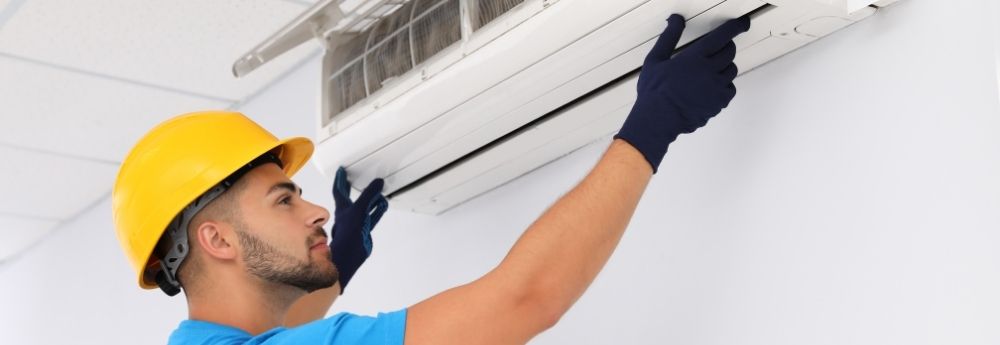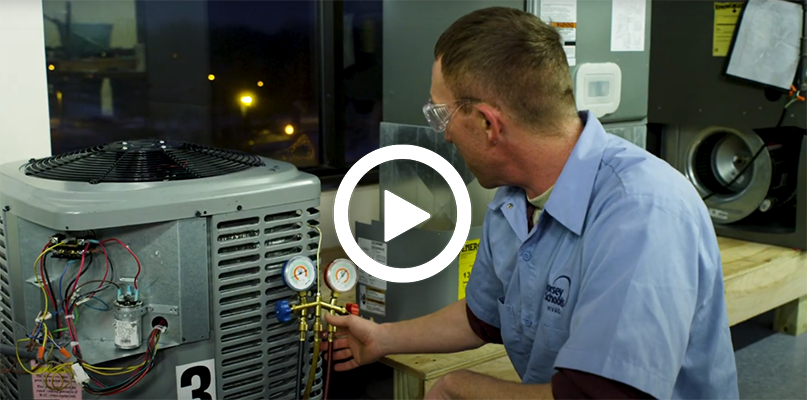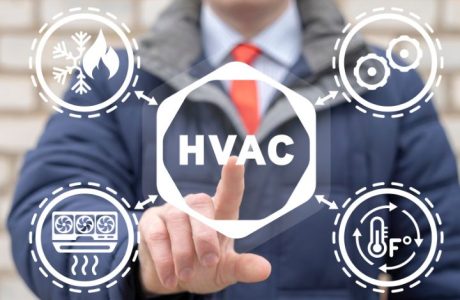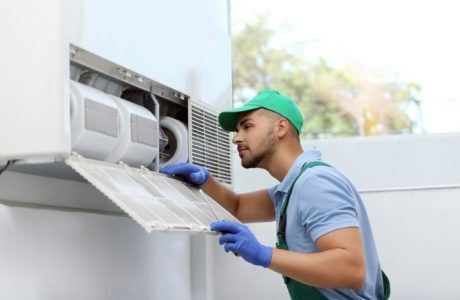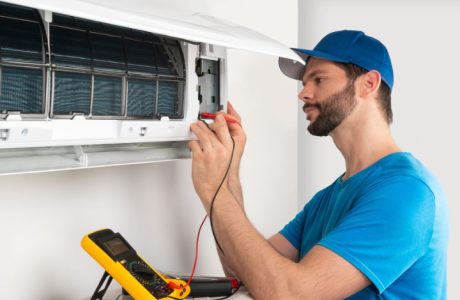Students enrolled in our HVAC Systems Technician training program at Dorsey College will have the chance to study maintenance, inspection, troubleshooting and the repair of related equipment. What does HVAC mean? HVAC stands for Heating Ventilation and Air Conditioning. In this comprehensive program, which provides the opportunity to learn through class work and an externship, students can gain knowledge of the practicalities and technicalities of cooling and heating systems.
Find A Campus Near You
The HVAC Systems Technician diploma program is offered at the following Dorsey College campus locations:HVAC Systems Technician training program – Michigan career training
The curriculum covers workplace skills and the HVAC basics, including electricity, home heating systems, refrigeration, central heat and air units, as well as residential and commercial systems. Additionally, blueprinting, system design and the now topical environmentally-friendly practices of weatherization and sustainability are taught. Students prepare for EPA Universal Certification. No prior experience in this field is required to enroll in our HVAC Systems Technician training program, just the desire to learn.
HVAC technicians may perform a variety of duties, including, but not limited to:
- Install and maintain heating, ventilation and air conditioning systems
- Perform general and preventative maintenance on central heating and air units
- Calibrate thermostats
- Change filters
- Repair motors
- Service home heating systems
- Order supplies and equipment needed for HVAC maintenance or installation
- Handle maintenance of tools and equipment
- Replace faulty or expired parts in an HVAC system
HVAC / Heating Ventilation and Cooling training includes:
- A hands-on approach to instruction and learning in the classroom.
- Fundamental education in HVAC basics, electricity, refrigeration, and residential and commercial systems.
- An externship is included in the program allowing students to apply what they have learned throughout the program while gaining industry experience.
- During the course of the program, students will challenge the EPA Section 608 Type 2 Certification exam, which is generally required to work in the heating, ventilation, and air conditioning industry.
Dorsey College will pay the cost one time for students in this program to challenge this certification exam, contingent upon the student meeting Dorsey College’s exam preparation requirements.
HVAC Systems Technician Career Outlook
HVAC technicians may enjoy stable employment in this branch of the skilled trades. Typical HVAC technician duties associated with these positions include installing, performing general and preventative maintenance on central heating and air units, servicing home heating systems, and troubleshooting heating, ventilation, and air conditioning systems. HVAC jobs may be found in residential, commercial, construction, and industrial settings. The tasks and duties that HVAC technicians perform include services such as maintenance, inspection, troubleshooting, repair and/or replacement of HVAC equipment.
According to the US Department of Labor, Bureau of Labor Statistics, employment of heating, air-conditioning, and refrigeration mechanics and installers (positions that can be filled by HVAC Systems Technician graduates) is projected to grow 6% from 2022 to 2032.a In addition, according to the State of Michigan DTMB, Bureau of Labor Market Information and Strategic Initiatives, employment of heating, air-conditioning, and refrigeration mechanics and installers (positions that can be filled by HVAC Systems Technician graduates) is projected to grow 9.2% from 2020 to 2030.b
HVAC Frequently Asked Questions
Want to learn more about:
- What HVAC Systems Technicians Do
- Becoming an HVAC Systems Technician
- The Dorsey College HVAC Systems Technician program
Check out our HVAC Systems Technician FAQ page!
Accreditation
Dorsey College is accredited by the Commission of the Council on Occupational Education. This applies to the Roseville, Saginaw, Wayne, and Woodhaven campuses (which are branch campus locations of Madison Heights). Contact information for the Council on Occupational Education is as follows: 7840 Roswell Road, Building 300, Suite 325, Atlanta, GA 30350, telephone: 770-396-3898 / FAX: 770-396-3790, www.council.org.
Financial Aid
Financial aid is available to those who qualify.
Additional Information
For your reference, we’ve included the links below of several very helpful websites where you can learn more about HVAC Systems Technicians, info pertaining to Jobs as an HVAC Systems Technician, the work HVAC Systems Technicians do, etc.:
- Michigan Occupational Wage Information: http://milmi.org/?PAGEID=67&SUBID=124
- O*Net Online: http://www.onetonline.org/link/summary/49-9021.01
aBureau of Labor Statistics, U.S. Department of Labor, Occupational Outlook Handbook, Heating, Air Conditioning, and Refrigeration Mechanics and Installers, on the Internet at http://www.bls.gov/ooh/installation-maintenance-and-repair/heating-air-conditioning-and-refrigeration-mechanics-and-installers.htm (visited December 31, 2023).
bMichigan DTMB, Bureau of Labor Market Information and Strategic Initiatives, Long-Term Occupational Employment Projections (2020-2030) Michigan Statewide, Heating, Air Conditioning, and Refrigeration Mechanics and Installers (SOC Code: 49-9021), https://milmi.org/ (visited January 9, 2024).

